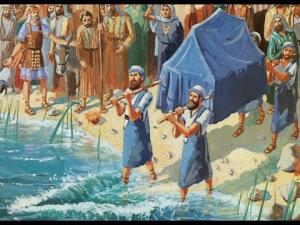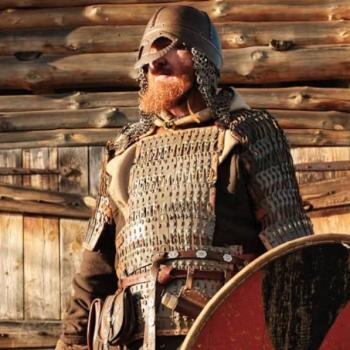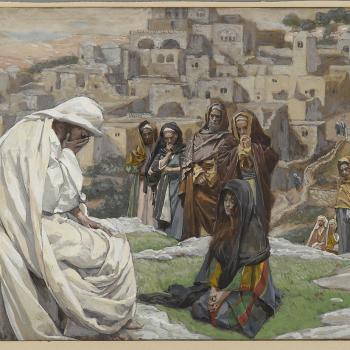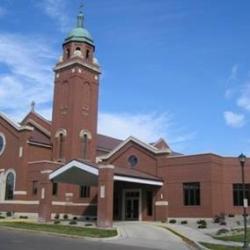
Israel’s journey to the Promised Land is a metaphor for life. So Israel could have hope for the future. Israel combined that hope with justice for the oppressed. God had commanded them to remember when they themselves had been slaves in Egypt.
Episode 11 of the Rowing with Michael Series: A journey through the Jewish/Christian Scriptures in Verse and Commentary. Introduction and Contents for this series HERE.
Michael, row the boat ashore. Alleluia….
- The River Jordan was deep and wide. Alleluia.
- Milk and honey on the other side. Alleluia.
- The river was chilly and the river was cold, Alleluia.
- But the waters parted, so I’ve been told. Alleluia.
I changed a few words in this verse of the spiritual. My version makes you think of history and makes you wonder: Did it really happen? The story says God parted the waters of the Jordan River just like at the Red Sea. But did God really part waters twice, or even once?
The Israelites could have crossed the Jordan on their own without divine help. We don’t need to imagine a miracle every time something impossible or astounding occurs in a Bible story. It could be Israel’s faith interpreting history in the third chapter of Joshua. It could be just the way people remember things. Patterns get imposed on unique events. In this case the pattern might be “in cahoots with nature” or “nature in cahoots with God.” So Israel “remembered” nature assisting them when God willed it. On other occasions they “remembered” nature punishing them when that was God’s will. I think the correctness of the faith is a separate issue from the accuracy of the memory—but not totally separate. After all, Israel put her faith in a God who acts in history.
Journey, a metaphor for life
The original version of the song is poetic. It puts everything in the present—“The River Jordan is (now) chilly and cold.” It makes you think of your own life as a journey to the Promised Land. It makes the whole story of Israel’s journey from Egypt to the Promised Land into a metaphor for life. It’s a well-loved metaphor—life as a journey. It has given hope to oppressed people and meaning when life otherwise seemed to have none. I like it for its sense of adventure. It’s a journey with no coming back, so it’s not like a vacation or even a pilgrimage or vision quest. After any of those journeys you’re back where you started, changed maybe, but still back home.
If life is a journey, then home is a place we’ve never been. Where we are now has names like “exile,” “valley of tears,” a place we are “in” but not “of.” These are pretty much negative descriptions. They answer well to the experience of half of the people on the planet or more, not so well to my own. But I distance myself from my rather comfortable situation and remember that I am in the same category as the poor of the world when I think of life as a journey. God told Israel to remember their journey in the same spirit:
You shall not violate the rights of the alien or of the orphan, nor take the clothing of a widow as a pledge. For, remember, you were once slaves in Egypt, and the LORD, your God, ransomed you from there; that is why I command you to observe this rule. When you reap the harvest in your field and overlook a sheaf there, you shall not go back to get it; let it be for the alien, the orphan or the widow . . . . For remember that you were once slaves in Egypt; that is why I command you to observe this rule. (Deuteronomy 24:17-22)
It doesn’t say “Your ancestors” but “You were once slaves in Egypt.”
Justice and hope
There had passed many generations since the Israelites had become a nation. Israel had more pleasant memories than slavery in Egypt, some more imaginary than real, like this one—
Judah and Israel lived in security, every man under his vine or under his fig tree, from Dan to Beer-sheba, as long as Solomon lived. (1 Kings 5:5)
But they were not owners of the land, or vines and fig trees. Long after they had settled down in the land God had given them, they still could not do with the land or its produce whatever they liked. A farmer could work a particular piece of land for only six years. Then it had to take a “Sabbath” rest, lie fallow for a year. Every 50th year all land that was sold had to return to the family that had owned it originally. The price of land was greater or less depending on the number of years until that “year of restoration.”
Your land must not be sold on a permanent basis, because you do not own it; it belongs to God, and you are like foreigners who are allowed to make use of it. (Leviticus 25:23)
If destitute, Israelites could sell themselves into slavery. Other Israelites could acquire them for service as slaves, provided they observed rules for treating slaves. But it could only be temporary. Slaves, like purchased land, were freed during the year of restoration.
By Jesus’ time the wealthy had figured out ways to get around the letter of the law, as wealthy people generally do. But the idea didn’t die. From the metaphor of a journey an impressive sort of justice and hope sprang up—justice for us who may be resting too comfortably in the feeling of being at home and hope for people whose homelessness is not figurative but real.











